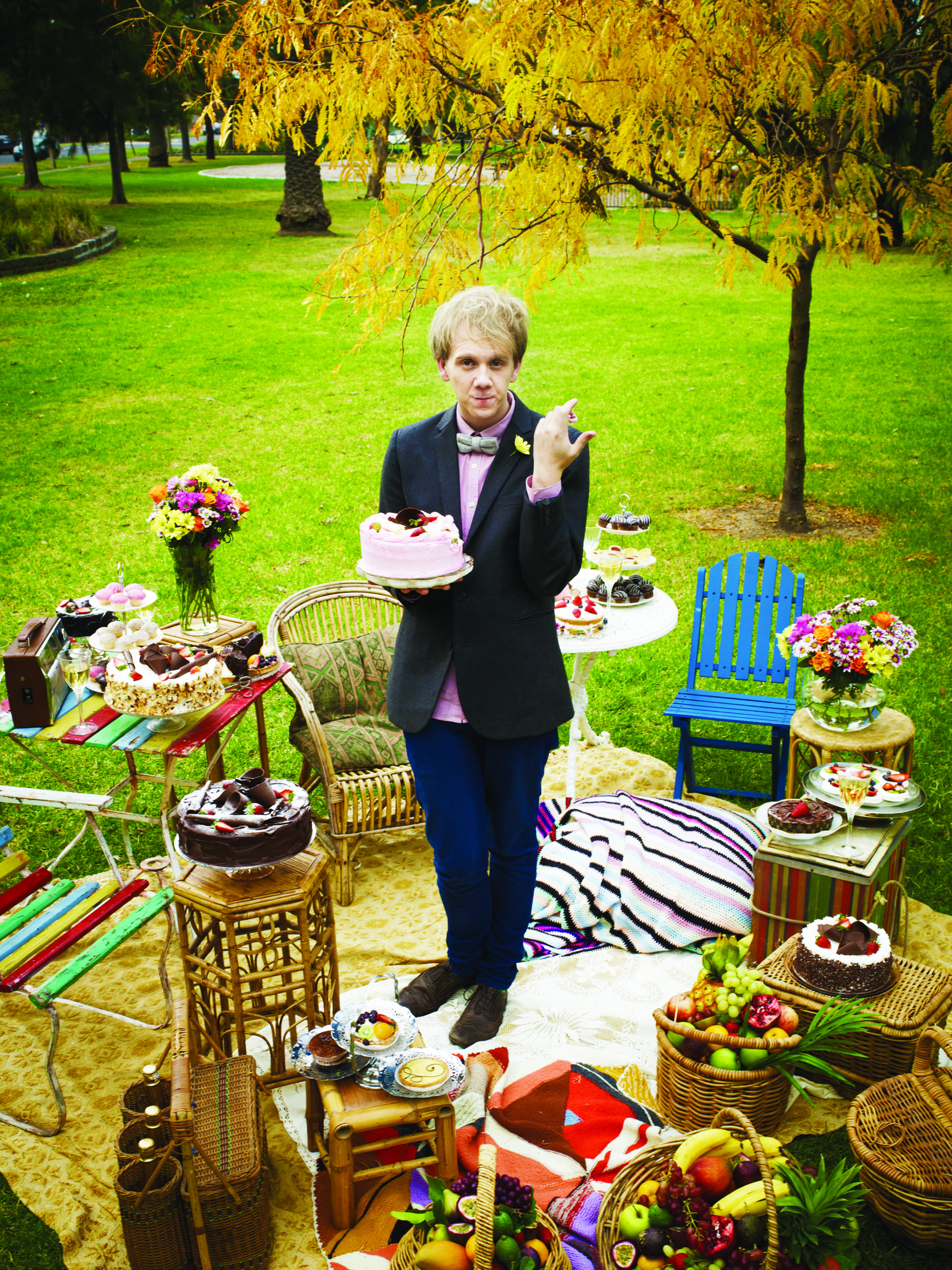Being gay has been a theme in Josh Thomas’ comedy repertoire since he came out on his podcast, Josh Thomas and Friend, in 2009. Since then, Thomas’ regular appearances on TV shows like Rove Live, Good News Week and The Project, along with his sustained slog on the stand-up comedy circuit, have made him into an Australian media personality. In 2010, he was included on the ‘Same Same 25’, a list of publicly nominated queer Australians who are ‘shaping how we view the world and exerting a huge influence over a variety of fields’.[1]‘The Same Same 25’, Same Same, 2010, <http://www.samesame.com.au/25/2010/>, accessed 2 May 2014. In 2009, Thomas also began appearing as the regular generation Y team captain on Channel Ten’s game show Talkin’ ’Bout Your Generation. Even to audiences who aren’t aware of his sexuality, the Josh Thomas schtick – playful, impishly endearing, awkward, diffident, skinny jeans and a bowtie – is firmly associated with gen Y. So, in addition to being recognised as a queer comedian, Thomas has become even more closely identified with the so-called millennials, a cohort that, in the intervening years, has become the subject of ubiquitous puff journalism and increasing advertiser interest.
Due to his now–decade long career in stand-up and on TV, then, Thomas is uniquely recognised by Australian audiences as that funny gen Y gay. For better or for worse, we expect him to tell us things about these twin constituencies – young queers, and young people in general. Such were the expectations surrounding the arrival of the six-part series Please Like Me, which Thomas both writes and stars in, on ABC2 last year.
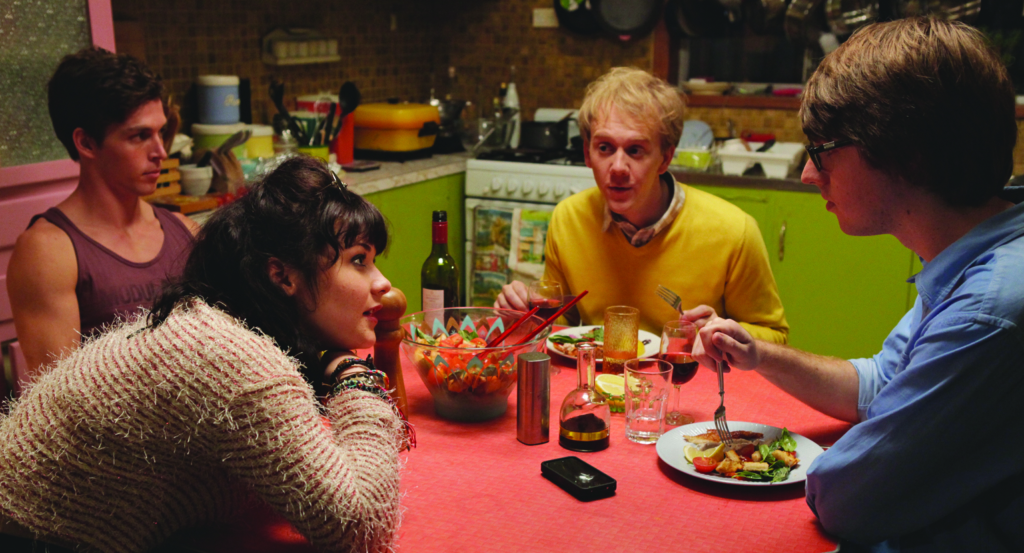
Liking Please Like Me
In the series, Thomas plays Josh, a younger version of himself whose life is based on events from Thomas’ own early twenties. To kick things off, Josh’s girlfriend, Claire (Caitlin Stasey), breaks up with him over an expensive sundae because they’re ‘growing apart’ and, as she tells him, he’s ‘probably gay’. By that evening, he’s fallen absurdly into bed with his first male lover, the cute but insipid Geoffrey (Wade Briggs), whom he discovers crying at the office of his best friend, Tom (played by Josh Thomas’ real-life bestie, Thomas Ward). Sexuality is certainly in the foreground here, but this is TV written by and for millennials, so it’s not the main – or the only – dramatic event: after he wakes up next to Geoffrey the next morning, Josh discovers a stream of messages reporting that his depressed, recently divorced mother, Rose (Debra Lawrance), has overdosed on Panadol and has been hospitalised. Josh will need to move back in with Rose to take care of her.
Sexuality is certainly in the foreground here, but this is TV written by and for millennials, so it’s not the main – or the only – dramatic event.
These events frame the rest of the series. Josh awkwardly negotiates this new boy romance while living with his mother – meaning that he must also face off the permanent scowl of lovable old sour fruit Aunty Peg (Judi Farr), who thinks he and his mother should go to church, as well as mediate between his mother and his father, Alan (David Roberts). Alan is acting out his own post-divorce crisis in predictable middle-aged boomer-man ways: he hides his new Thai girlfriend, Mae (Renee Lim), from ex-wife Rose and has bought an expensive sports car that, according to Mae, makes him look ‘old and stupid’. If Josh’s social and sexual life is awkward, his parents’ lives are a Mongolian clusterfuck.
In terms of character and plot, there’s a lot that’s predictable about this set-up: wry, adorkable protagonist with quirky but endearing friends, hapless boomers in midlife-crisis mode, God-fearing battleaxe aunty … the list goes on. None of this is particularly new, but most of it – including his mother’s suicide attempt – does in fact originate from Thomas’ life,[2]See June Thomas, ‘New Network Targets Millennials with Gay Man’s Version of Girls (and It’s Good)’, Slate, 30 July 2013, <http://www.slate.com/blogs/browbeat/2013/07/30/pivot_tv_airs_josh_thomas_please_like_me_targeting_millennials_with_gay.html>, accessed 2 May 2014. and in Please Like Me it gets treated sensitively and intelligently. Everything hinges on the wit and warmth – and on the occasionally called-for gravitas – of Thomas’ performance.
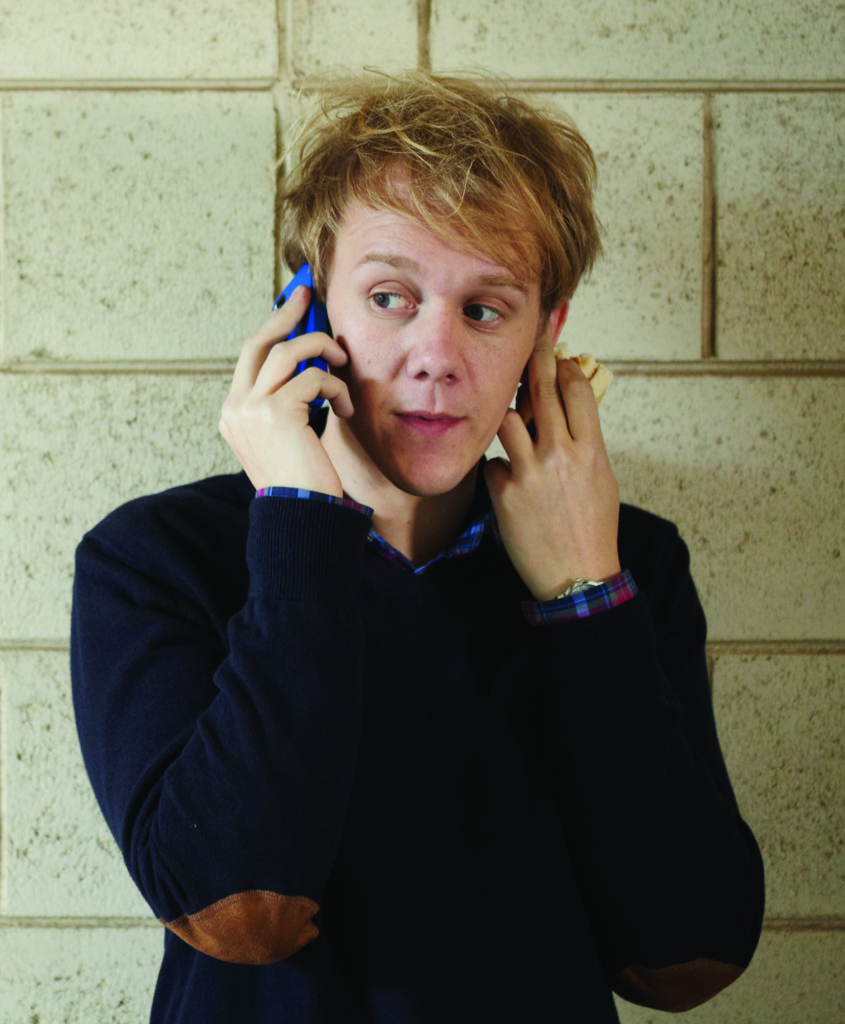
This is, of course, a version of the signature Josh Thomas brand of humorous performance, although more fully and dramatically realised. Both Thomas and Please Like Me’s Josh have been described as ‘whimsical’, but it’s not so much that his character is fanciful or has unrealistic expectations; rather, he can be impulsive, speak his mind’s vision of the world and literally has whims that he wants to test out, whether these are advisable or not. He’s sprightly and can be capricious, yes, but somehow, paradoxically, he’s extremely grounded. A lot of the most satisfying gags in Please Like Me are actually premised on the idea that Josh is a sane, reasonable person in a world gone slightly batty. ‘You can’t threaten an atheist with hell, Peg,’ he calmly explains to his great aunt, who is essentially on the threshold of blackmailing him into attending church. ‘It doesn’t make any sense. It’s like a hippie threatening to punch you in your aura.’
Josh isn’t so much the ‘lovable rogue’ as a young man who is coming to consciousness: diffidently self-aware, on the threshold of important life lessons and self-knowledge. Perhaps the success of this portrayal can be attributed to the unique effect of someone in his mid twenties playing his twenty-year-old self. This is also why Please Like Me has so often been compared to Lena Dunham’s Girls, although technically the latter is less autobiographical. What the two series share is a knowingness – as Craig Mathieson described it in The Sydney Morning Herald, Please Like Me is ‘cluey’.[3]Craig Mathieson, ‘Thomas the Frank Engine’, The Sydney Morning Herald, 21 February 2013, <http://www.smh.com.au/entertainment/box-seat/thomas-the-frank-engine-20130220-2eq3l.html#ixzz2LWJ1gfOU>, accessed 11 January 2014.
Of course, this isn’t to say it’s all–knowing. Sagely, Thomas has given his avatar limitations. For example, Josh breaks things off with Geoffrey twice and, despite his awareness that he’s not really interested in the relationship, he impulsively invites Geoffrey back when he’s lonely – classic immature behaviour, and very relatable. When this happens a second time, Geoffrey confronts Josh with a home truth: ‘You’re only into me when you’re feeling needy and alone […] And, when I’m naked, so […] I just wanna be friends, okay?’ There are things Thomas understands that his younger, fictionalised self is still learning. Though it might be what suffices in an episode of Talkin’ ’Bout My Generation, being witty and self-effacing can’t solve all of life’s complicated scenarios. However, what Please Like Me does show us is that humour can go somewhere towards illuminating them.
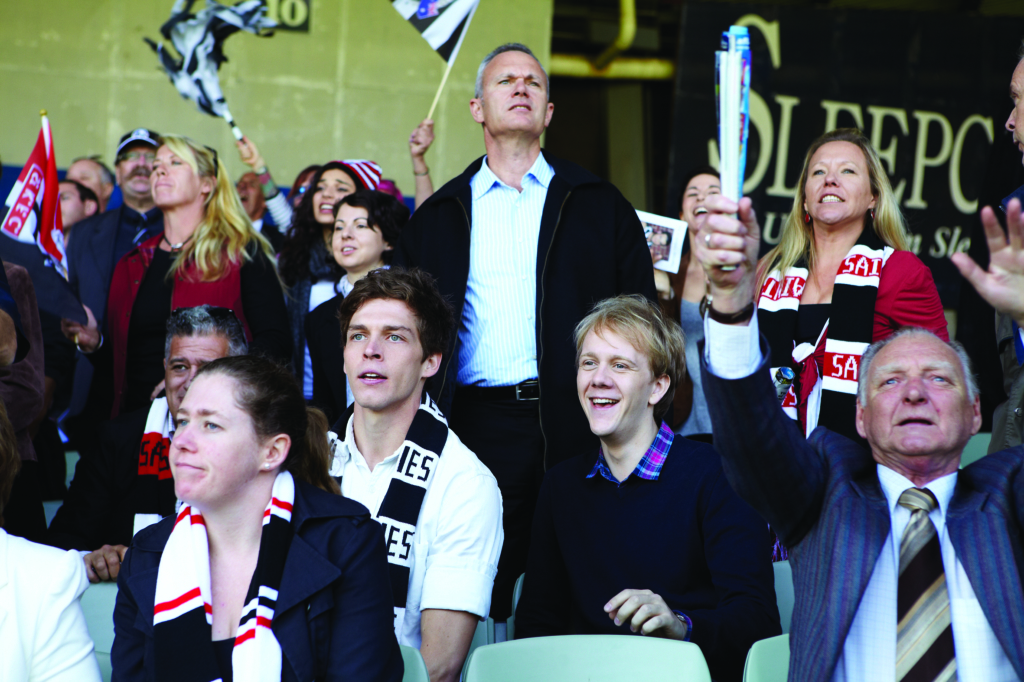
Boomer angst
Much of the drama – and, in turn, the comedy – of Please Like Me is generated by wrestles Josh has with his parents, dramatising the humiliations and frustrations born of a clash between two differently equipped generations. Josh trudges reluctantly out of the closet – although with epic quotation marks around ‘coming out’ – in a ritual that seems irrelevant to him but somehow necessary for his parents. He tells Geoffrey:
I just … I just can’t be bothered. Do I really need to tell them? Coming out, to me, just seems so nineties. They’ve seen me in school musicals; do they really need a discussion?
Josh doesn’t want a clichéd coming-out scene but then, of course, he really gets one. Midway through the series, Geoffrey and Josh come to Alan’s rescue when, after behaving belligerently, Josh’s inebriated dad is abandoned by Mae in a fancy restaurant. When they eventually find Alan’s ridiculous sports car, it’s been egged. Alan makes a drunken scene about the effects this will have on the paint, and so they take the car to a car wash. As if all this isn’t ridiculous enough, while trapped together in this intimate, claustrophobic space, Geoffrey decides to explain to Alan that he is Josh’s boyfriend, effectively outing Josh to his dad. What follows is a real humdinger:
ALAN: Okay. It’s alright, Josh […] I’ve decided I’m fine with it […] After all, it’s probably my fault.
GEOFFREY: It’s not anyone’s fault.
ALAN: I didn’t play enough sport with you when you when you were a kid […] Just promise me that you’ll use protection. A homosexual man is thirty times more likely to get AIDS.
JOSH: No, that’s not a fact, Dad. That’s not science. I really don’t think that’s a real statistic.
ALAN: Do you use protection, Geoffrey?
GEOFFREY: Oh, look, actually it’s a bit awkward to talk about, Alan. We … haven’t had penetrative sex yet, but, when we do, I promise you we will use protection.
ALAN: Oh. Well, good, that’s good news. I know it doesn’t feel as good, but, gee whiz, it feels a hell of a lot better than dying at thirty.
GEOFFREY: You got that right.
JOSH: Dad, please stop.
ALAN: Oh, relax, will ya? Some fathers would punch you for this. I’m a pretty good dad.
In scenes like this, Thomas could be furnishing a moving-image treatise on humiliation. Everything happens with generous lashings of embarrassment, sometimes it’s a little agonising, but rarely is it unidentifiable.
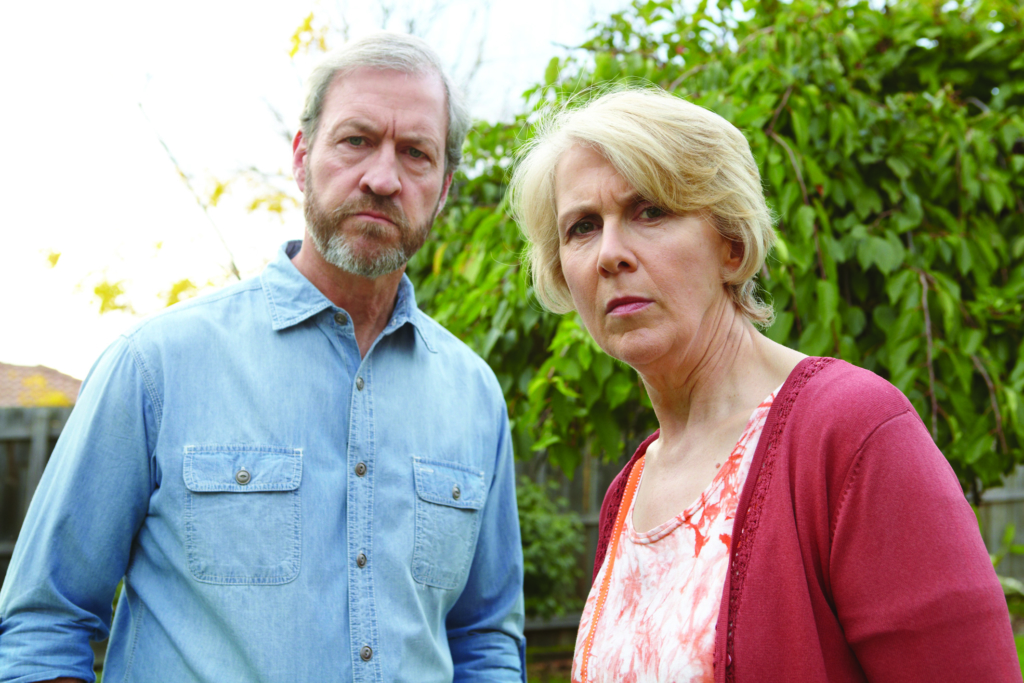
Yet some of these moments can also feel a little lethargic, as Roger Cormier writes:
The Wiseass Kid/Adults Are Useless tropes are as old as television, and at times the dialogue between the relaxed, full-of-jokes Josh and his uptight father Alan are guilty of relying too much on the tired scenario.[4]Roger Cormier, ‘Please Like Me Is the Best New TV Comedy You’ve Never Heard of’, Splitsider, 6 August 2013, <http://splitsider.com/2013/08/please-like-me/>, accessed 14 January 2014.
There is a catalogue of such intergenerational scenarios in the show, and they do occasionally feel a little stale. Josh reluctantly agrees to take and upload some photos of his mother when she decides to set up an online dating profile (‘Josh! Take it with the boobs out!’). Rose and Alan attempt to have a heated fight via SMS, but they’re both hopelessly slow at mobile-phone typing and at negotiating pre-emptive text. We get it: parents are hopeless with technology, lol.
You get the impression that Thomas is less sympathetic to the unreconstructed boomer father … and, to some degree, Please Like Me is a small entry in the long tradition of gay male cultural production concerned with the relationship between gay men and their mothers.
The generational difference is at its best as a source of both comedy and drama, however, when it is exposed for its melancholic as well as its frustrating and entertaining effects. For instance, Rose is profoundly distressed when Josh takes her to see a psychiatrist – she’s deeply ashamed at the prospect that someone will see her there. Josh is empathetic but seems far less fazed by professional therapy: ‘No-one’s gonna see you, Ma … And if they do, they’re probably mental too, so that’s nice – you can bond.’ Throughout, Josh responds dutifully if reluctantly to his parents’ crises while understanding that these crises are actually chronic and aren’t likely to sort themselves out anytime soon. Like Peg irrationally forcing Josh to attend church, Josh’s boomer parents proceed largely through the assertion of arbitrary authority, even when they are blatantly behaving stupidly, like Alan so often does. In fact, many of the jokes are on Alan, and you get the impression that Thomas is less sympathetic to the unreconstructed boomer father. Josh is willing to return to the cause of rescuing his mother again and again, right up to the end of the series, and, to some degree, Please Like Me is a small entry in the long tradition of gay male cultural production concerned with the relationship between gay men and their mothers (think: the films of Pedro Almodóvar and Xavier Dolan, the novels of Michael Cunningham, etc.). One of the upshots of this privileging of matrocentric desire is that queer artists remain ambivalent about their fathers, and Please Like Me is on the cusp of this: Alan remains ridiculous and somewhat unredeemed, and the series is most comfortable when he’s someone else’s (i.e. Mae’s) problem.
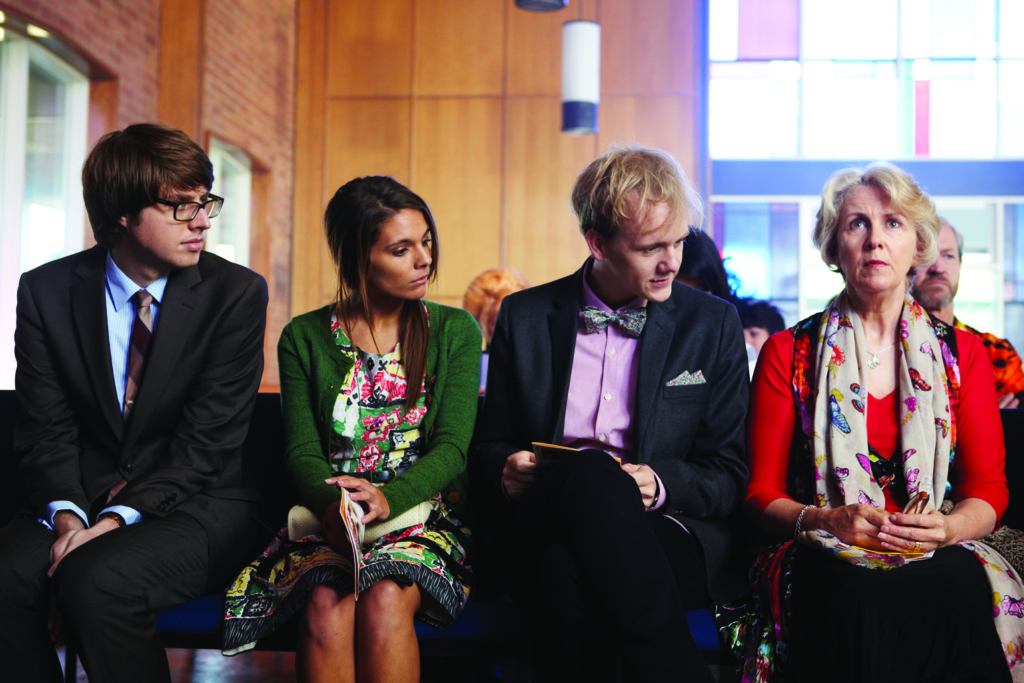
Too gay or too millennial?
Please Like Me screened on ABC2 in February 2013 after it was bumped from ABC1. Unsurprisingly, this export to the much smaller, niche audience–oriented channel prompted speculation on whether the show might have been ‘too gay’ for mainstream TV. News outlets seized on the programming change to hint at a familiar story of Australian TV networks being squeamish about gay content. Thomas, who is rarely reticent about his feelings, responded:
They told me [the switch to ABC2] was a compliment […] I don’t know if what they were really saying was, ‘Josh the show is a bit s—’ or, ‘Josh the show has too much suicide and gay sex in it’. People have suggested to me that [too gay] is why they did it […] I would be shocked if that’s why but I also wouldn’t be.[5]‘Is Josh Thomas’s Show Too Gay for ABC1?’, News.com.au, 27 February 2013, <http://www.news.com.au/entertainment/tv/is-joshs-show-too-gay-for-abc1/story-e6frfmyi-1226586521979>, accessed 11 Jan 2014.
If you look closely at what Thomas says here, it’s actually more ambivalent than that he thought the programming shift was about a reluctance to put gay sex on mainstream TV. He’s having it both ways, hinting at the paradoxical position of queer representation in contemporary popular culture: he would have been surprised if gay sex was being concealed, but he also wouldn’t be. Elsewhere, Thomas was more positive but still genuinely ambivalent about the programming shift:
Artistically I’m ecstatic that it’s on ABC2. It’s cooler, it’s a hip place where hip people will go to watch it […] As far as paying my mortgage goes, I would prefer it to be on the network more people watch.[6]Mathieson, op. cit.
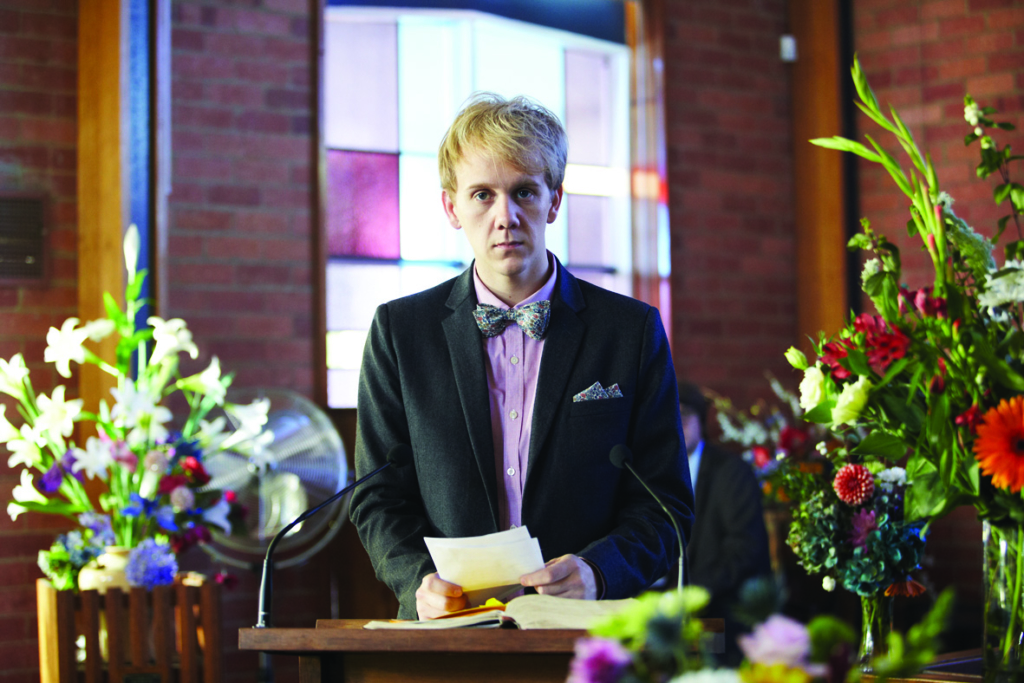
The miniature fuss about gay sex on the ABC was all but forgotten when Pivot, a new American digital-cable and satellite channel targeted openly at the millennial (18–34) audience, picked up Please Like Me as part of its initial selection of flagship programs. After ditching their plan to remake it, Pivot screened Please Like Me in its original Australian format, and announced that it had commissioned and would co-produce a second season of ten episodes alongside the ABC. When Pivot first streamed into 40 million American homes in August 2013, three hours of its very first prime-time programming were devoted to this humble Australian television import. Thomas very quickly became a funny gay millennial to a much larger audience. He appeared on a promotional panel alongside Joseph Gordon-Levitt and other stars from Pivot’s line-up. His mug was all over Pivot’s website as well as on the sides of buses promoting the show in major US cities.
You would have to search fairly comprehensively to track down an unenthusiastic review of Please Like Me. Local critics have been upbeat, albeit with some characteristically Australian reserve. Scott Ellis in The Age called the series ‘gentle’ and ‘insightful’ while ‘cover[ing] some pretty tough ground’,[7]Scott Ellis, ‘The Guide’, The Age, 21 February 2013, <http://media.theage.com.au/entertainment/the-guide/please-like-me-4050990.html>, accessed 15 January 2014. and Crikey’s Laurence Barber described it as ‘delightfully awkward’, a ‘wry, often moving, unfussy account of family, friends and relationships’.[8]Laurence Barber, ‘Please Like Me: Why You Should Answer Josh Thomas’ Plea’, Crikey, 3 April 2013, <http://blogs.crikey.com.au/wiresandlights/2013/04/03/please-like-me-why-you-should-answer-josh-thomas’s-plea/>, accessed 10 January 2014. Of course, less sympathetic comments are easy to scroll down upon in online threads.[9]For example, user ‘moustacherider’ comments that Thomas is ‘super annoying and he never sits down on TBYG [Talkin’ ’Bout Your Generation] ffs’; see ‘Please Like Me Too Gay for Mainstream TV?’, Oh No They Didn’t, 3 January 2013, <http://ohnotheydidnt.livejournal.com/75862931.html#ixzz2zU9SX2MF>, accessed January 11 2014. As is typical with comedians who push some envelope or other, Thomas is irresistible to some and exasperating to others. American critics, who are likely bringing less ‘Josh Thomas baggage’ with them, have gushed more emphatically. Emily Nussbaum of The New Yorker writes that Please Like Me
is fuelled, quite effectively, by the diffident charisma of Josh Thomas […] Boyish and wry, Thomas [is] a member of that reserved breed of gay men who rarely appear on TV but are everywhere in the offices where I’ve worked.[10]Emily Nussbaum, ‘Kids Today: Pivot, a New Channel for Millennials’, The New Yorker, 16 September 2013, <http://www.newyorker.com/arts/critics/television/2013/09/16/130916crte_television_nussbaum>, accessed January 11 2014.
Please Like Me was also named one of Entertainment Weekly’s ‘10 Best TV Shows of ’13’ for its ‘spot-on portrayal of quarter-life confusion’.[11]Melissa Maerz, ‘10 Best Shows of ’13: Melissa Maerz’s Picks’, Entertainment Weekly, 20 December 2013, <http://www.ew.com/ew/gallery/0,,20760444_20760448,00.html#30058081>, accessed 2 May 2014.
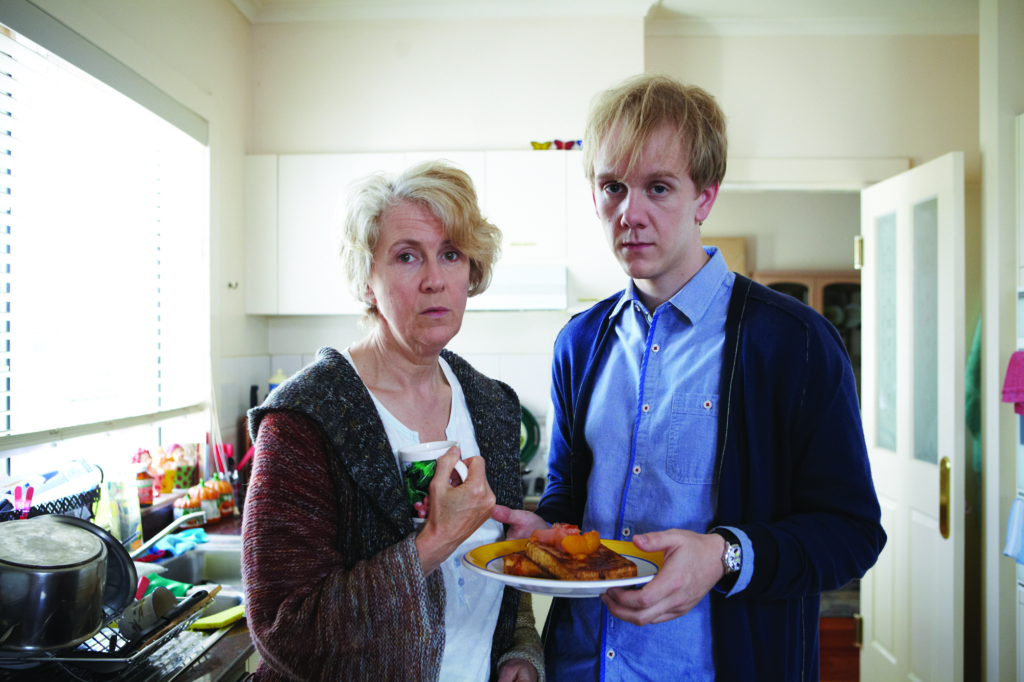
Not a ‘big dramatic deal’
Although Pivot has marketed itself as a socially aware network, claiming to program shows that ‘spark conversation’ and ‘inspire change’,[12]Michael Lallo, ‘Josh Thomas Gets his Sex and the City Moment’, The Sydney Morning Herald, 30 July 2013, <http://www.smh.com.au/entertainment/tv-and-radio/josh-thomas-gets-his-sex-and-the-city-moment-20130730-2qvyo.html>, accessed 2 May 2014. Josh remains fairly agnostic about the show’s queer politics:
I don’t come at it with any point […] I didn’t write that story with the vision of trying to get gay marriage passed. I just was writing my view of the world, and some people will take some things from that.[13]Mandi Bierly, ‘Please Like Me Creator Josh Thomas on the Girls Comparison, His Love of Everybody Loves Raymond’, Entertainment Weekly, 1 August 2013, <http://insidetv.ew.com/2013/08/01/please-like-me-josh-thomas-pivot/>, accessed 2 May 2014.
These are somewhat predictable disavowals, and it’s fair enough that he makes them. Thomas is likely well aware of his singular status as one of Australia’s youngest, most high-profile, most successful queer TV personalities, and also as a default spokesperson for both gen Y and young queers.[14]Interestingly, surveys conducted by youth market-research firm YPulse show that there is a strong appetite for alternative images of millennials, who have been ‘misrepresented’ in shows like Gossip Girl, Teen Mom, Glee, Girls and a surfeit of bad reality TV; see YPulse, ‘Millennials Sound Off: Does Anything on TV Represent Their Generation?’, 18 February 2014, <http://www.ypulse.com/post/view/millennials-sound-off-does-anything-on-tv-represent-their-generation>, accessed 12 March 2014. Why should he also have to articulate a cogent vision of his work’s politics?
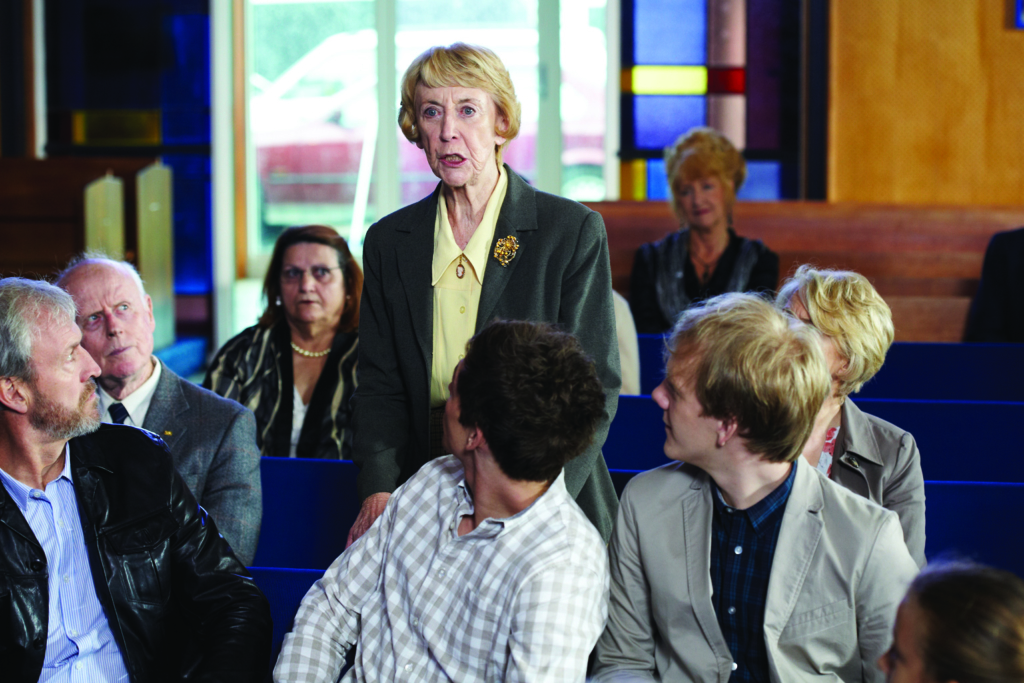
It’s hard to assess whether Please Like Me presents a progressive challenge to the sexual status quo, or whether it has assimilationist impulses, or whether such questions still warrant asking. The series’ rather undramatic portrait of ‘coming out’ is true to Thomas’ real-life experience, which he describes as less of a ‘big dramatic deal’ and more like ‘when your mom explains what tampons are’. For a certain type of young queer person like Thomas – who, as he acknowledges, is ‘from the middle class’ and ‘live[s] in a city’ – coming out is only one among many of the dramas of early adulthood.[15]Matt Kane, ‘Comedian Josh Thomas Speaks with GLAAD about Please Like Me and His US Debut’, GLAAD blog, 1 August 2013, 1 August 2013, <http://www.glaad.org/blog/comedian-josh-thomas-speaks-glaad-about-please-me-and-his-us-debut/>, accessed 16 March 2014.
If anything, the challenge posed by Thomas’ show is not that it’s ‘too gay’, but rather that the intergenerational misunderstandings it dramatises aren’t so easily resolved – and ultimately, perhaps, are ones we as a culture haven’t really grappled with yet. Season 2 of Please Like Me is currently in production and, according to a teaser from Thomas, Rose is now living in a psychiatric hospital.[16]Mandi Bierly, ‘Please Like Me: Josh Thomas Teases Season 2 — LISTEN!’, Entertainment Weekly, 16 April 2014, <http://insidetv.ew.com/2014/04/16/please-like-me-season-2-josh-thomas/>, accessed 7 May 2014. For Josh, as for most Australian millennials – queer or otherwise – the complications that arise from living alongside now-ageing boomer parents will not likely be resolved neatly or simply.
Endnotes
| 1 | ‘The Same Same 25’, Same Same, 2010, <http://www.samesame.com.au/25/2010/>, accessed 2 May 2014. |
|---|---|
| 2 | See June Thomas, ‘New Network Targets Millennials with Gay Man’s Version of Girls (and It’s Good)’, Slate, 30 July 2013, <http://www.slate.com/blogs/browbeat/2013/07/30/pivot_tv_airs_josh_thomas_please_like_me_targeting_millennials_with_gay.html>, accessed 2 May 2014. |
| 3 | Craig Mathieson, ‘Thomas the Frank Engine’, The Sydney Morning Herald, 21 February 2013, <http://www.smh.com.au/entertainment/box-seat/thomas-the-frank-engine-20130220-2eq3l.html#ixzz2LWJ1gfOU>, accessed 11 January 2014. |
| 4 | Roger Cormier, ‘Please Like Me Is the Best New TV Comedy You’ve Never Heard of’, Splitsider, 6 August 2013, <http://splitsider.com/2013/08/please-like-me/>, accessed 14 January 2014. |
| 5 | ‘Is Josh Thomas’s Show Too Gay for ABC1?’, News.com.au, 27 February 2013, <http://www.news.com.au/entertainment/tv/is-joshs-show-too-gay-for-abc1/story-e6frfmyi-1226586521979>, accessed 11 Jan 2014. |
| 6 | Mathieson, op. cit. |
| 7 | Scott Ellis, ‘The Guide’, The Age, 21 February 2013, <http://media.theage.com.au/entertainment/the-guide/please-like-me-4050990.html>, accessed 15 January 2014. |
| 8 | Laurence Barber, ‘Please Like Me: Why You Should Answer Josh Thomas’ Plea’, Crikey, 3 April 2013, <http://blogs.crikey.com.au/wiresandlights/2013/04/03/please-like-me-why-you-should-answer-josh-thomas’s-plea/>, accessed 10 January 2014. |
| 9 | For example, user ‘moustacherider’ comments that Thomas is ‘super annoying and he never sits down on TBYG [Talkin’ ’Bout Your Generation] ffs’; see ‘Please Like Me Too Gay for Mainstream TV?’, Oh No They Didn’t, 3 January 2013, <http://ohnotheydidnt.livejournal.com/75862931.html#ixzz2zU9SX2MF>, accessed January 11 2014. |
| 10 | Emily Nussbaum, ‘Kids Today: Pivot, a New Channel for Millennials’, The New Yorker, 16 September 2013, <http://www.newyorker.com/arts/critics/television/2013/09/16/130916crte_television_nussbaum>, accessed January 11 2014. |
| 11 | Melissa Maerz, ‘10 Best Shows of ’13: Melissa Maerz’s Picks’, Entertainment Weekly, 20 December 2013, <http://www.ew.com/ew/gallery/0,,20760444_20760448,00.html#30058081>, accessed 2 May 2014. |
| 12 | Michael Lallo, ‘Josh Thomas Gets his Sex and the City Moment’, The Sydney Morning Herald, 30 July 2013, <http://www.smh.com.au/entertainment/tv-and-radio/josh-thomas-gets-his-sex-and-the-city-moment-20130730-2qvyo.html>, accessed 2 May 2014. |
| 13 | Mandi Bierly, ‘Please Like Me Creator Josh Thomas on the Girls Comparison, His Love of Everybody Loves Raymond’, Entertainment Weekly, 1 August 2013, <http://insidetv.ew.com/2013/08/01/please-like-me-josh-thomas-pivot/>, accessed 2 May 2014. |
| 14 | Interestingly, surveys conducted by youth market-research firm YPulse show that there is a strong appetite for alternative images of millennials, who have been ‘misrepresented’ in shows like Gossip Girl, Teen Mom, Glee, Girls and a surfeit of bad reality TV; see YPulse, ‘Millennials Sound Off: Does Anything on TV Represent Their Generation?’, 18 February 2014, <http://www.ypulse.com/post/view/millennials-sound-off-does-anything-on-tv-represent-their-generation>, accessed 12 March 2014. |
| 15 | Matt Kane, ‘Comedian Josh Thomas Speaks with GLAAD about Please Like Me and His US Debut’, GLAAD blog, 1 August 2013, 1 August 2013, <http://www.glaad.org/blog/comedian-josh-thomas-speaks-glaad-about-please-me-and-his-us-debut/>, accessed 16 March 2014. |
| 16 | Mandi Bierly, ‘Please Like Me: Josh Thomas Teases Season 2 — LISTEN!’, Entertainment Weekly, 16 April 2014, <http://insidetv.ew.com/2014/04/16/please-like-me-season-2-josh-thomas/>, accessed 7 May 2014. |
